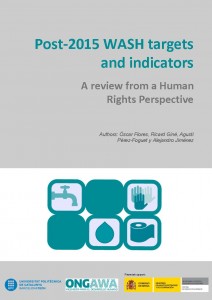Post-2015 WASH Targets and Indicators: A Review from a Human Rights Perspective (2013)
Summary: In the Water, Sanitation and Hygiene (WASH) sector, different consultations have been conducted in recent years, and of primary importance has been the process led by the WHO/UNICEF Joint Monitoring Programme (JMP). It takes already existing monitoring mechanisms as starting point, and makes use of the principles underlying the human right to water and sanitation as guidance for the formulation of new targets and indicators. The aim of this work is twofold. First, it analyses the JMP post-2015 WASH targets and indicators, from a human rights perspective. Second, the report focuses on challenges and recommendations for a local level implementation of this monitoring proposal.
This research builds on a combination of relevant literature review and specific local experience from four case studies, namely the district of Kibondo (Tanzania), the districts of Homa Bay and Suba (Kenya), the municipality of Manhiça (Mozambique), and the municipality of San Sebastián de Yalı (Nicaragua). All these case studies have been implemented by IS.UPC in collaboration with ONGAWA, UNICEF Kenya Country Office, UN Habitat-Mozambique and other local stakeholders.
The report "Post-2015 WASH targets and indicators. A review from a Human Rights Perspective" was prepared by the University Research Institute for Sustainability Science And Technology – IS.UPC at the Universitat Politècnica de Catalunya, within a project carried out by ONGAWA, Ingeniería para el Desarrollo Humano, with the support of the Human Rights Office of the Spanish Ministry of Foreign Affairs and Cooperation.

